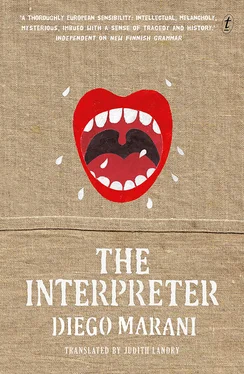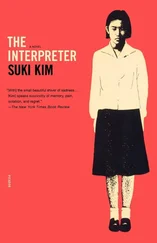‘What news of the big outside world?’ Ortega asked me, raising his voice a little so that everyone could hear.
I shrugged, desperately casting around for something to say.
‘Is it true that by now the only language spoken is English?’ he asked me, his voice suddenly grave.
‘Not quite…’ I ventured.
‘Well, I’m here because I can’t learn it,’ he admitted, twiddling with his fork.
‘English is the language of cowards and queers,’ broke in the colonel angrily from the other side of the table, causing Mrs Popescu to jump and raise her hand to her chest in alarm.
‘Never trust a language which is written one way and spoken in another! Filthy transvestites!’ declared the former officer, flapping his napkin in front of him, to general dismay.
The nurse who was passing between the tables with the food trolley was about to intervene. Ortega shook his head and looked disapproving; then he carried on eating, waiting for Colonel Kwiatkowski to lower his head to his plate again.
‘Which intensive course are you taking?’ he asked me cautiously after a pause, covering his mouth with his napkin.
‘Romanian. Actually, I haven’t started yet. I have my first session tomorrow,’ I said without much conviction.
‘Romanian? That’s odd! You’re the first person I’ve ever met here who’s doing an intensive course in Romanian. I didn’t even know there was one!’ remarked Ortega, pouring himself a glass of water.
‘Romanian’s for schizophrenia!’ Kwiatkowski burst in, his mouth full, jabbing his forefinger at the yellow strip attached to his pocket alongside five others, one red, one green, one mauve, one orange and one blue.
‘And a fat lot of good it did me! Indeed, now I’m not allowed even that! They’ll end up by forbidding me German too. That way I won’t be able to speak at all, and then I really will be cured!’ He burst out into a noisy laugh, revealing toothless gums, only to be seized by an obstinate coughing fit which caused his face to go purple. Holding his napkin to his mouth, he looked around him, as though seeking approval from his fellow diners, but they kept their eyes firmly on their plates. Seeing the nurse approaching, Kwiatkowski raised his hands in a gesture of surrender; his eyes were bright and the veins in his forehead were swelling like whips as the coughing fit died down.
‘Frau Goldstein, don’t look at me like that, you’ll give me bad dreams! I won’t say another word, I promise!’ he added hoarsely in a tone of mock alarm. The nurse paused for a moment a few steps from our table, biting her lip in disapproval, then went back silently to her trolley.
After supper I followed Ortega into the common room; chess sets and playing cards were laid out; people could listen to music or read books and newspapers. There was no sign of any language except German; even the music was exclusively by German composers. Lined up against the end wall were various armchairs, with sockets for headphones linked up to a stereophonic player. In front of a large window, what looked like normal social activity was under way.
Two generously proportioned women, eyes heavily made up, were playing rummy at a table at the end of the room, in front of a large bookshelf which occupied the whole of the left-hand wall, smiling cheerfully at one another and throwing down their cards as though they were flowers. Beside them on a three-legged table stood two large tankards containing a cloudy liquid from which, every so often, they took an unenthusiastic sip.
‘Watered-down anise,’ explained Ortega, intercepting my look. ‘Mrs Guzman is Argentinian, and Spanish is her mother tongue. Mrs Mikhailov on the other hand is Bulgarian, but they are both doing an intensive course in Greek. In the outside world, they both used to be opera singers, and both suffered serious nervous breakdowns linked to the stress of live performance; as you can see from their crimson stripes, both are forbidden to speak Italian. Mikhailov isn’t allowed to speak Russian either; they caught her singing an aria from Boris Godunov in the bath, so she was given two weeks of intensive Georgian by way of punishment. While she was away, Guzman carried on setting out the cards for their game of rummy as though her friend were with her in the room, but Frau Goldstein, ever the stickler, refused to serve two tankards of watered-down anise. Outside the laboratories, no one has ever heard them utter a word; it’s as though they were completely dumb. Even their expressions are dazed and vacant; but if you creep up unnoticed, you’ll hear them communicating with each other through operatic arias — with their mouths closed, so as not to arouse suspicion. Frau Goldstein has twigged their game and tries in vain to catch them by surprise, but placid and harmless as they look, those two are as fleet as hares. The moment she starts creeping up on them, they swallow up their song and give her an angelic smile. They are the only people in the clinic for whom music is forbidden!’
Staring at their resolutely closed mouths, I too was tempted for a moment to try to catch them at it, but my attention soon wandered, intrigued as I was by the novelty of my peculiar surroundings. The centre of the room was occupied by a large billiards table; two scrawny men, who almost looked like twins, were chalking up the tips of their cues, concentrating on the arrangement of the balls.
‘The one on the right is Captain Lindqvist and the other is Vassilenko, a former Soviet obstacle race champion; they look as though they’re related, but they met here for the first time, and they’ve become inseparable. Vassilenko is a very serious type, he’s been doing an intensive course in Urdu and by now that’s all he’ll speak; you’ll hear him swearing in Urdu when he misses a shot. There’s really nothing wrong with Lindqvist, it’s just old age; when he retired, his wife found she couldn’t stand having him under her feet all day after so many years at sea, she just couldn’t be doing with him any more, so she persuaded him to come here. He thinks he’s in an officers’ club and calls everyone by the rank which he himself thinks that they deserve; for instance, he has Kwiatkowski down as a common sailor. Oddly enough, the colonel doesn’t take offence. “You godless cowards! I’ll sink the lot of you before you even get out of port!” he shouts at him every time they meet.’
Ortega had taken on the job of introducing me to my fellow inmates. Without the slightest hesitation, or the slightest fear of seeming to speak out of turn, with just a hint of malice, he told me what illnesses the other patients were suffering from. For a moment I was tempted to ask him about his own problem, about what bizarre mania held him in its thrall, but I didn’t want to break the flow. After all, his information was useful to me; it helped me take my bearings vis-à-vis those eccentric sufferers who would be my companions for goodness knows how long. I stared in amusement at the fake twins as they in turn stared at the green baize, already curious as to the rank that the old captain would assign me when we became acquainted, but was disturbed to note the white strip buttoned onto Vassilenko’s jacket pocket. Ortega and I walked past the big window and sat down at a table set slightly apart, away from the crowd of various gameplayers, who would occasionally break out into lively argument; nearby, Colonel Kwiatkowski was playing chess on his own.
‘Don’t pay too much heed to the colonel, he isn’t always that brusque; actually, he’s the jolliest soul on our table, he’s just a bit of a loudmouth. Tomorrow he won’t even remember what he said last night. But today has been a difficult day for him: they’ve put him on an intensive course of Seroa, an extinct language once spoken in southern Africa. He’ll be put into isolation if he doesn’t improve. Seroa is a very archaic click-language — it has three different types of click. Doctor Barnung has recourse to such brutal expedients only in extreme cases. But, as you can see, Kwiatkowski has run through almost all his languages; he can’t keep a grip on anything. He’s gradually absenting himself from his own consciousness; the languages he speaks are eaten up by the gangrene caused by the disease. He comes from an ancient and noble Polish family which emigrated to Germany, where they spoke a different language every day in order to honour all the branches of the family: German on Mondays, Russian on Tuesdays, Swedish on Wednesdays, Romanian on Thursdays, Hungarian on Fridays, Czech on Saturdays and Polish only on Sundays. Kwiatkowski needs all these languages to stay alive. His identity is a seven-headed monster, but only one of them can live. Think of septuplets, seven different individuals all sharing the organs of a normal body; it’s a bit as though the colonel’s liver were in Germany, one lung in Sweden, the other in Romania, his eyes in Hungary and his heart in Poland. Doctor Barnung is trying to sever the colonel’s consciousness from those parts of him that will simply not be able to survive and save at least one of all those identities.’
Читать дальше












